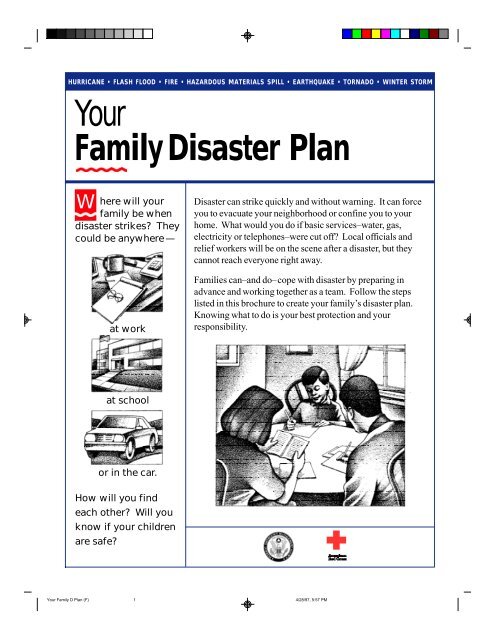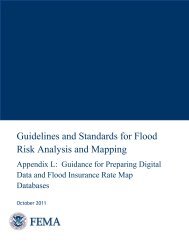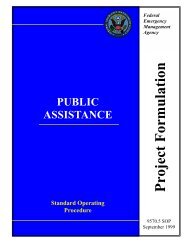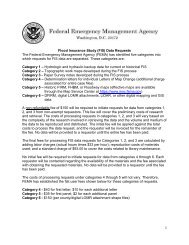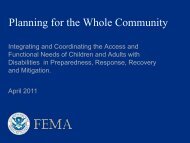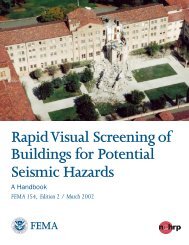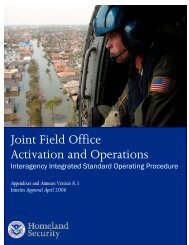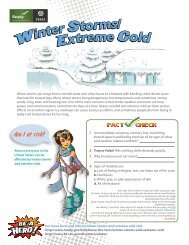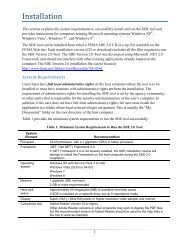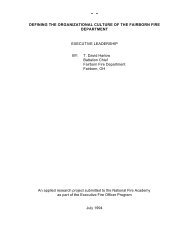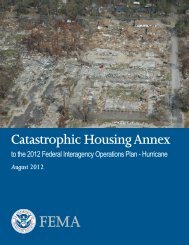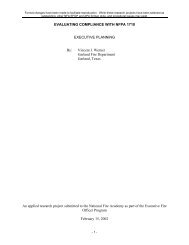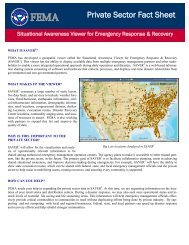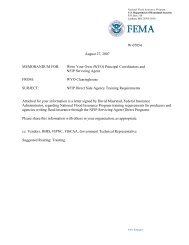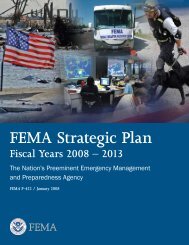Your Family Disaster Plan - Delaware Emergency Management ...
Your Family Disaster Plan - Delaware Emergency Management ...
Your Family Disaster Plan - Delaware Emergency Management ...
- No tags were found...
You also want an ePaper? Increase the reach of your titles
YUMPU automatically turns print PDFs into web optimized ePapers that Google loves.
HURRICANE • FLASH FLOOD • FIRE • HAZARDOUS MATERIALS SPILL • EARTHQUAKE • TORNADO • WINTER STORM<br />
<strong>Your</strong><br />
<strong>Family</strong> <strong>Disaster</strong> <strong>Plan</strong><br />
W<br />
here will your<br />
family be when<br />
disaster strikes They<br />
could be anywhere—<br />
at work<br />
<strong>Disaster</strong> can strike quickly and without warning. It can force<br />
you to evacuate your neighborhood or confine you to your<br />
home. What would you do if basic services–water, gas,<br />
electricity or telephones–were cut off Local officials and<br />
relief workers will be on the scene after a disaster, but they<br />
cannot reach everyone right away.<br />
Families can–and do–cope with disaster by preparing in<br />
advance and working together as a team. Follow the steps<br />
listed in this brochure to create your family’s disaster plan.<br />
Knowing what to do is your best protection and your<br />
responsibility.<br />
at school<br />
or in the car.<br />
How will you find<br />
each other Will you<br />
know if your children<br />
are safe<br />
<strong>Your</strong> <strong>Family</strong> D <strong>Plan</strong> (F)<br />
1<br />
4/28/97, 5:57 PM
EMERGENCY SUPPLIES<br />
Keep enough supplies in your home<br />
to meet your needs for at least three<br />
days. Assemble a <strong>Disaster</strong> Supplies Kit<br />
with items you may need in an evacuation.<br />
Store these supplies in sturdy,<br />
easy-to-carry containers such as backpacks,<br />
duffle bags or covered trash<br />
containers.<br />
Include:<br />
■ A three-day supply of water (one<br />
gallon per person per day) and<br />
food that won’t spoil.<br />
■ One change of clothing and footwear<br />
per person, and one blanket<br />
or sleeping bag per person.<br />
■ A first aid kit that includes your<br />
family’s prescription medications.<br />
■ <strong>Emergency</strong> tools including a battery-powered<br />
radio, flashlight and<br />
plenty of extra batteries.<br />
■ An extra set of car keys and a credit<br />
card, cash or traveler’s checks.<br />
■ Sanitation supplies.<br />
■ Special items for infant, elderly or<br />
disabled family members.<br />
■ An extra pair of glasses.<br />
Keep important family documents in a<br />
waterproof container. Keep a smaller<br />
kit in the trunk of your car.<br />
UTILITIES<br />
Locate the main electric fuse box, water<br />
service main and natural gas main.<br />
Learn how and when to turn these<br />
utilities off. Teach all responsible<br />
family members. Keep necessary tools<br />
near gas and water shut-off valves.<br />
Remember, turn off the utilities only if<br />
you suspect the lines are damaged or if<br />
you are instructed to do so. If you turn<br />
the gas off, you will need a professional<br />
to turn it back on.<br />
4 Steps to Safety<br />
Find Out What Could Happen to You<br />
Contact your local emergency management or civil defense office and American Red<br />
Cross chapter — be prepared to take notes:<br />
❏ Ask what types of disasters are most<br />
likely to happen. Request information<br />
on how to prepare for each.<br />
❏ Learn about your community’s<br />
warning signals: what they sound<br />
like and what you should do when<br />
you hear them.<br />
❏ Ask about animal care after disaster.<br />
Animals may not be allowed inside<br />
2<br />
Create a <strong>Disaster</strong> <strong>Plan</strong><br />
Meet with your family and discuss why you need to prepare for disaster. Explain the<br />
dangers of fire, severe weather and earthquakes to children. <strong>Plan</strong> to share responsibilities<br />
and work together as a team.<br />
❏ Discuss the types of disasters that are<br />
most likely to happen. Explain what<br />
to do in each case.<br />
❏ Pick two places to meet:<br />
1. Right outside your home in case of<br />
a sudden emergency, like a fire.<br />
2. Outside your neighborhood in<br />
case you can’t return home.<br />
Everyone must know the address and<br />
phone number.<br />
Fill out, copy and distribute to all family members<br />
<strong>Emergency</strong> Meeting Place<br />
Meeting Place<br />
Address<br />
<strong>Family</strong> Contact<br />
4 1<br />
<strong>Family</strong> <strong>Disaster</strong> <strong>Plan</strong><br />
outside your neighborhood<br />
day<br />
emergency shelters due to health<br />
regulations.<br />
❏ Find out how to help elderly or<br />
disabled persons, if needed.<br />
❏ Next, find out about the disaster<br />
plans at your workplace, your<br />
children’s school or daycare center<br />
and other places where your family<br />
spends time.<br />
❏ Ask an out-of-state friend to be your<br />
“family contact.” After a disaster, it’s<br />
often easier to call long distance.<br />
Other family members should<br />
call this person and tell them where<br />
they are. Everyone must know your<br />
contact’s phone number.<br />
❏ Discuss what to do in an evacuation.<br />
<strong>Plan</strong> how to take care of your pets.<br />
(name)<br />
outside your home<br />
Phone<br />
Phone ( ) Phone ( )<br />
evening<br />
<strong>Your</strong> <strong>Family</strong> D <strong>Plan</strong> (F)<br />
2<br />
4/28/97, 5:57 PM
❏ Post emergency telephone numbers<br />
by phones (fire, police, ambulance,<br />
etc.).<br />
❏ Teach children how and when to call<br />
911 or your local <strong>Emergency</strong> Medical<br />
Services number for emergency help.<br />
❏ Show each family member how and<br />
when to turn off the water, gas and<br />
electricity at the main switches.<br />
❏ Check if you have adequate insurance<br />
coverage.<br />
❏ Teach each family member how to<br />
use the fire extinguisher (ABC type),<br />
and show them where it’s kept.<br />
3<br />
Complete This Checklist<br />
❏ Install smoke detectors on each level<br />
of your home, especially near<br />
bedrooms.<br />
❏ Conduct a home hazard hunt.<br />
❏ Stock emergency supplies and<br />
assemble a <strong>Disaster</strong> Supplies Kit.<br />
❏ Take a Red Cross first aid and CPR<br />
class.<br />
❏ Determine the best escape routes<br />
from your home. Find two ways out<br />
of each room.<br />
❏ Find the safe spots in your home for<br />
each type of disaster.<br />
HOME HAZARD HUNT<br />
During a disaster, ordinary objects<br />
in your home can cause injury or<br />
damage. Anything that can move,<br />
fall, break or cause a fire is a home<br />
hazard. For example, a hot water<br />
heater or a bookshelf can fall.<br />
Inspect your home at least once a<br />
year and fix potential hazards.<br />
Contact your local fire department<br />
to learn about home fire hazards.<br />
4<br />
Practice and Maintain <strong>Your</strong> <strong>Plan</strong><br />
❏ Quiz your kids every six months so<br />
they remember what to do.<br />
❏ Conduct fire and emergency<br />
evacuation drills.<br />
Year<br />
Drill Date<br />
❏ Replace stored water every three<br />
months and stored food every six<br />
months.<br />
❏ Test and recharge your fire<br />
extinguisher(s) according to<br />
manufacturer’s instructions.<br />
❏ Test your smoke detectors monthly<br />
and change the batteries at least once<br />
a year.<br />
Jan. ❏<br />
Feb. ❏<br />
Mar. ❏<br />
Apr. ❏<br />
May ❏<br />
June ❏<br />
Change batteries in<br />
NEIGHBORS HELPING NEIGHBORS<br />
(month)<br />
July ❏<br />
Aug. ❏<br />
Sep. ❏<br />
Oct. ❏<br />
Nov. ❏<br />
Dec. ❏<br />
each year.<br />
Working with neighbors can save lives and property. Meet with your<br />
neighbors to plan how the neighborhood could work together after a disaster<br />
until help arrives. If you’re a member of a neighborhood organization,<br />
such as a home association or crime watch group, introduce disaster preparedness<br />
as a new activity. Know your neighbors’ special skills (e.g.,<br />
medical, technical) and consider how you could help neighbors who have<br />
special needs, such as disabled and elderly persons. Make plans for child<br />
care in case parents can’t get home.<br />
EVACUATION<br />
Evacuate immediately if told<br />
to do so:<br />
■ Listen to your battery-powered<br />
radio and follow the instructions<br />
of local emergency officials.<br />
■ Wear protective clothing and<br />
sturdy shoes.<br />
■ Take your <strong>Disaster</strong> Supplies Kit.<br />
■ Lock your home.<br />
■ Use travel routes specified by<br />
local authorities — don’t use<br />
shortcuts because certain areas<br />
may be impassable or dangerous.<br />
If you’re sure you have time:<br />
■ Shut off water, gas and electricity<br />
before leaving, if instructed to do so.<br />
■ Post a note telling others when you<br />
left and where you are going.<br />
■ Make arrangements for your pets.<br />
<strong>Your</strong> <strong>Family</strong> D <strong>Plan</strong> (F)<br />
3<br />
4/28/97, 5:58 PM
IF DISASTER STRIKES<br />
If disaster strikes<br />
Remain calm and patient. Put your<br />
plan into action.<br />
Check for injuries<br />
Give first aid and get help for seriously<br />
injured people.<br />
Listen to your battery<br />
powered radio for<br />
news and instructions<br />
Evacuate, if advised to do so. Wear<br />
protective clothing and sturdy shoes.<br />
Check for damage in<br />
your home. . .<br />
■ Use flashlights — do not light<br />
matches or turn on electrical<br />
switches, if you suspect damage.<br />
■ Check for fires, fire hazards and<br />
other household hazards.<br />
■ Sniff for gas leaks, starting at the<br />
water heater. If you smell gas or<br />
suspect a leak, turn off the main<br />
gas valve, open windows, and<br />
get everyone outside quickly.<br />
■ Shut off any other damaged<br />
utilities.<br />
■ Clean up spilled medicines,<br />
bleaches, gasoline and other<br />
flammable liquids immediately.<br />
Remember to. . .<br />
■ Confine or secure your pets.<br />
■ Call your family contact—<br />
do not use the telephone again<br />
unless it is a life-threatening<br />
emergency.<br />
■ Check on your neighbors, especially<br />
elderly or disabled persons.<br />
■ Make sure you have an adequate<br />
water supply in case service is<br />
cut off.<br />
■ Stay away from downed power<br />
lines.<br />
The Federal <strong>Emergency</strong> <strong>Management</strong> Agency’s Community and <strong>Family</strong> Preparedness Program and the American Red<br />
Cross Community <strong>Disaster</strong> Education Program are nationwide efforts to help people prepare for disasters of all types.<br />
For more information, please contact your local emergency management office and American Red Cross chapter. This<br />
brochure and other preparedness materials are available by calling FEMA at 1-800-480-2520, or writing: FEMA, P.O.<br />
Box 2012, Jessup, MD 20794-2012.<br />
Publications are also available on the World Wide Web at:<br />
FEMA’s Web site: http://www.fema.gov<br />
American Red Cross Web site: http://www.redcross.org<br />
Ask for: Are You Ready, <strong>Your</strong> <strong>Family</strong><br />
<strong>Disaster</strong> Supplies Kit and Food & Water<br />
in an <strong>Emergency</strong>.<br />
Local sponsorship provided by:<br />
September 1991<br />
FEMA L-191<br />
ARC 4466<br />
<strong>Your</strong> <strong>Family</strong> D <strong>Plan</strong> (F)<br />
4<br />
4/28/97, 5:58 PM


